Sacraments
.
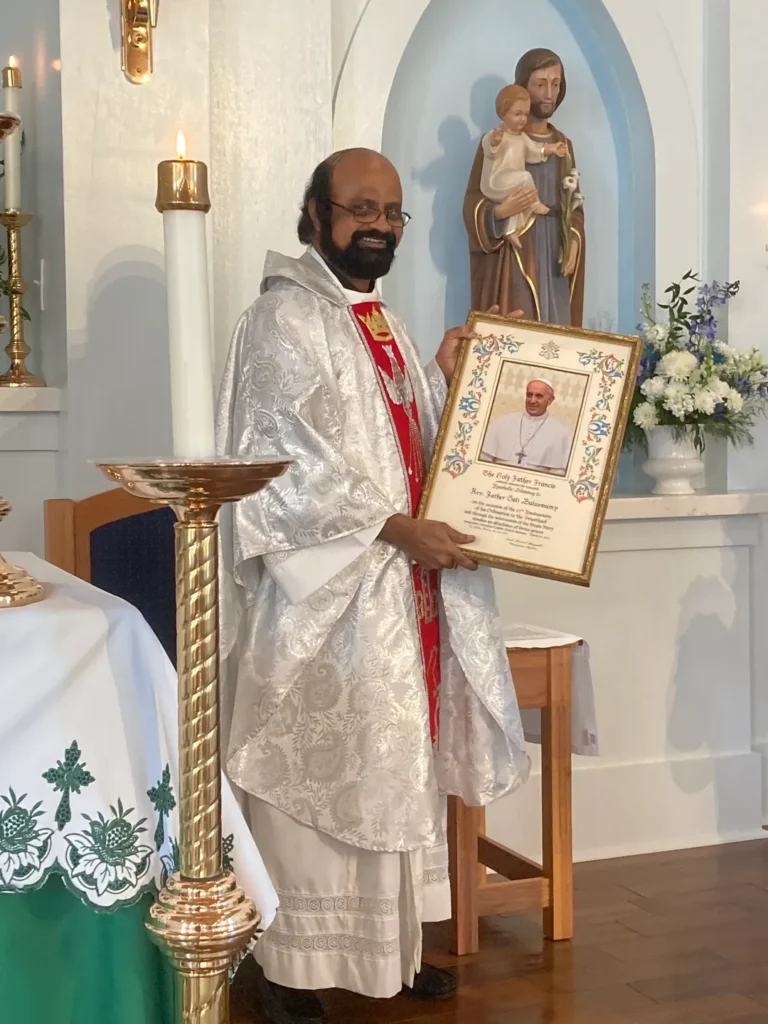
We offer a range of services and events, including weekly worship services, prayer groups, and community outreach programs. Our services are designed to provide support and guidance to individuals on their spiritual journey.
Baptism
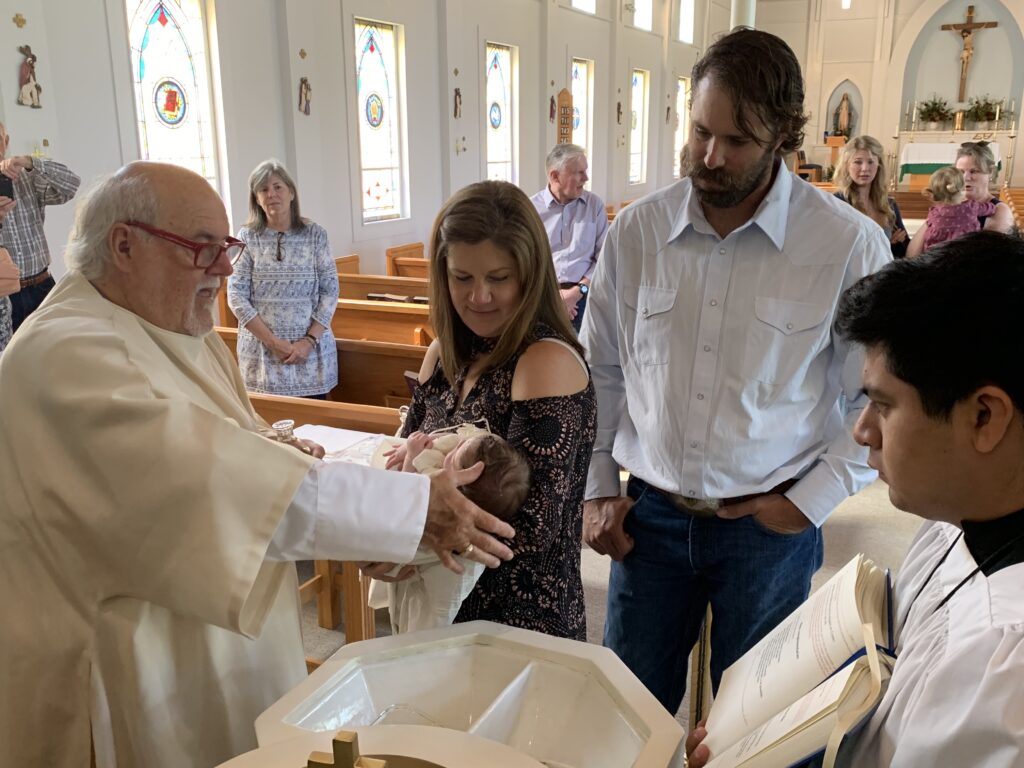
Baptism is the sacrament that frees man from original sin and from personal guilt, that makes him a member of Christ and His Church. It is thus the door to a new and supernatural life. This sacrament has been undisputed in the Church since the beginning of Christian tradition. It has never been rejected by any heresy intending to remain on a Christian basis. Doubts could arise only about the ways and means of administering it and on its effects and way of operation. These things are in essence what Church documents about baptism deal with.
THE CHURCH TEACHES
Baptism is a true sacrament instituted by Christ. It is administered by washing with natural water and at the same time invoking the Most Holy Trinity. Anybody, even an unbeliever or a heretic can validly administer baptism. Since it confers grace by the signs’ being properly carried out children can and should be baptized even while still infants. Baptism is necessary for salvation. Baptism effects the remission of original sin and actual sins and of all punishment due to sin; it confers sanctifying grace, membership in Christ and in the Church and the obligation to obey the Church’s laws, and give an indelible character.
Sacrament of the Eucharist
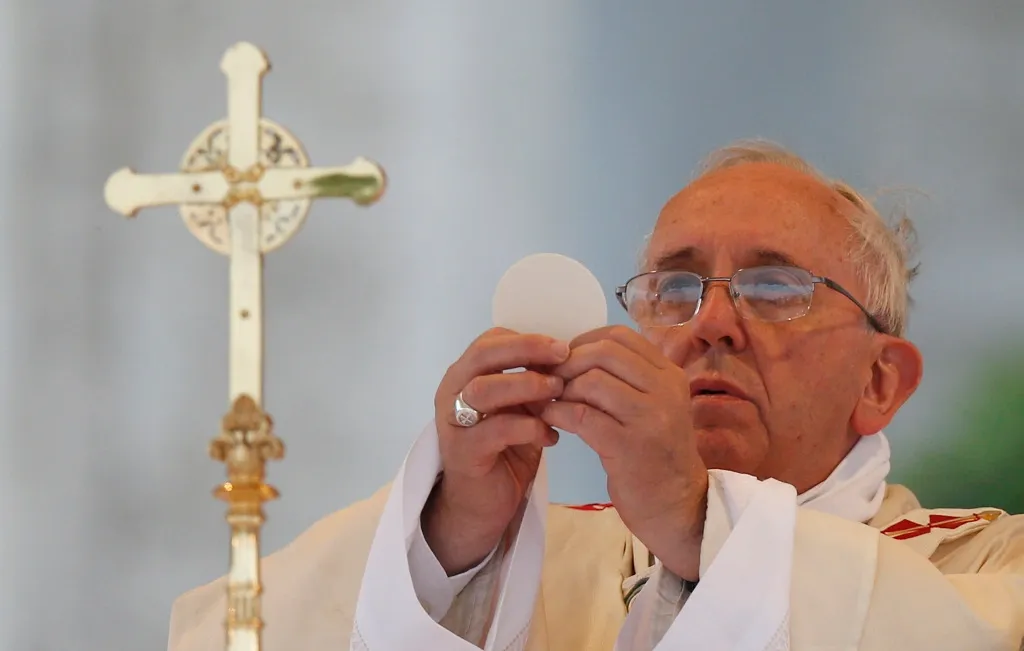
Sacrament of the Eucharist
The doctrine of the Holy Eucharist consists of that of the Eucharist sacrifice, the sacrificial meal, and the sacrificial food, or to express it otherwise, it consists of the doctrine of the Mass, of Communion, and of the Real Presence. There is no presence of Christ in the Blessed Sacrament that is not meant first and foremost as food for the faithful people, and there is no sacramental union with Christ in Holy Communion that is not to be thought of as a sacrificial meal: ‘For as often as you shall eat this bread, and drink the chalice, you shall show the death of the Lord, until he come’ (1 Cor. 11:26). The Eucharistic meal can only be prepared in the sacrifice of the Mass. Thus the mystery of the Eucharist summarizes the whole mystery of our redemption. There are two fundamental relationships in which Christ stands to us. First, he is our priestly mediator with God, and offers him atonement for our sins. Bust Christ is not a stranger to us, who merely represents us as a propitiator before God. He comes to us in the second relationship by being the mediator of the grace which God gives us on account of his sacrifice. That is the mystery of our union with Christ who is the source of all grace for us. ‘And of his fullness we have all received, grace for grace’ (John 1:16).
Confirmation
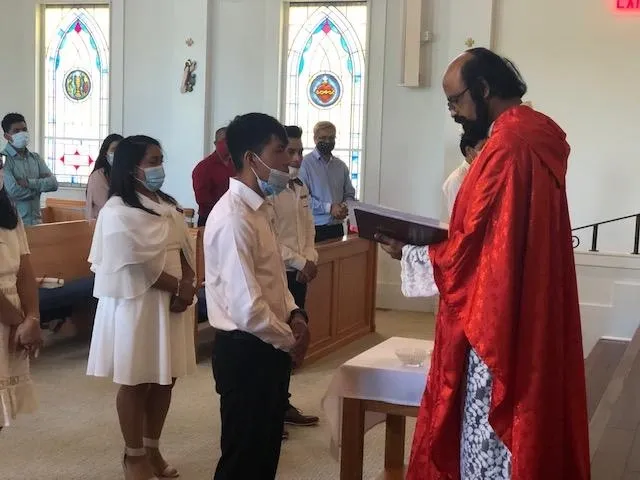
Sacrament of Confirmation
The sacrament of confirmation completes the sacrament of baptism. If baptism is the sacrament of re-birth to a new and supernatural life, confirmation is the sacrament of maturity and coming of age. The real confession of Christ consists in this ‘that the whole man submits himself to Truth, in the judgment of his understanding, in the submission of his will and in the consecration of his whole power of love . . . To do this, poor-spirited man is only able when he has been confirmed by God’s grace. This confirmation in the power of the Holy Spirit leading to a firm profession of faith has always been the particular effect which Catholic tradition has ascribed to the sacrament. It is effect which complements and completes that of baptism.
THE CHURCH TEACHES
Confirmation is a true sacrament instituted by Christ and different from baptism. It is administered by laying-on of hands and anointing with chrism accompanied by prayer. The chrism is blessed by the bishop and the bishop administers the sacrament. All baptized persons can and should be confirmed. The effect of the sacrament of confirmation is to give strength in faith and for the confession of faith and to impress an indelible character.
Penance
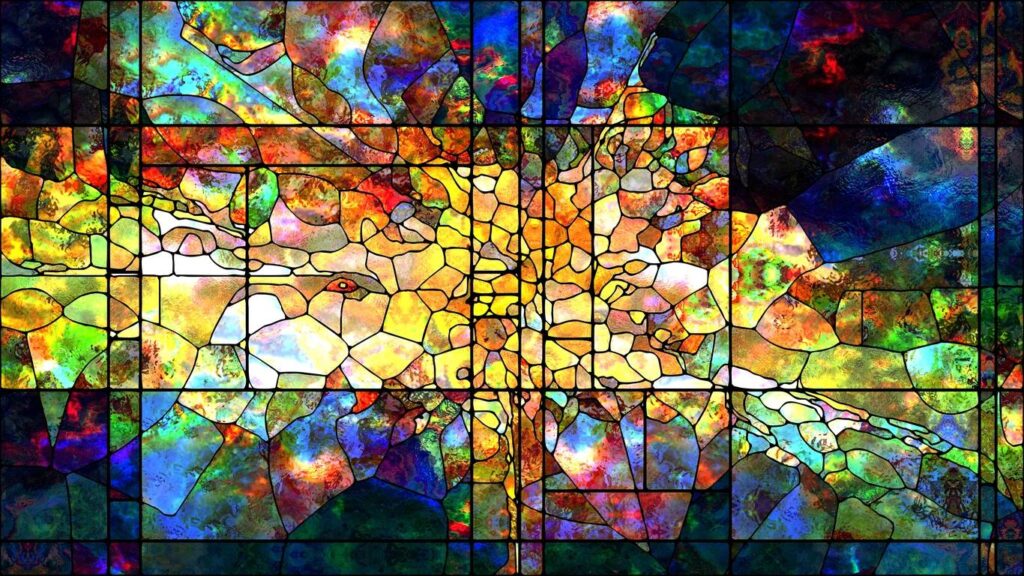
As to Penance. If the Church is to fulfill entirely her task of saving mankind, she needs the power to forgive sins. It is a power essentially different from her mission to preach the Gospel and baptize. In baptism, indeed all sins and the punishment due to them are remitted. Baptism is the first justification. But the first justification is also the first entry into the realm of the supernatural which works entirely by God’s grace, and which asks of the person baptized no more than that he turns away from sin and turn in faith to Christ. Penance is something different. A baptized person who sins again, sins against God to whom, since his baptism in the name of the Most Holy Trinity, he belongs. He also betrays the Church of which he is now a member. Thus, the new atonement assumes the character of a legal trial, with accusation, sentence, and satisfaction. The practice of penance has varied considerably down the centuries. In very early days satisfaction, usually in the form of public penance, was very much to the fore. Re-acceptance into the Church community normally took place only after completion of the penance imposed. More and more, however, penance has been withdrawn from the public domain and today only the private administration of the sacrament is still in use.
Anointing of the Sick
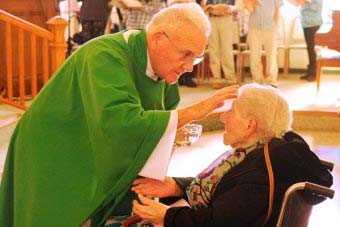
Anointing of the Sick
As to Anointing by conferring the Holy Spirit completes the sacrament of baptism, so extreme unction is the complement and completion of penance. Penance restores the justification lost by sin, extreme unction takes away the infirmity left by sin; it ‘removes that state which might be an obstacle to the clothing with glory of the resurrection’; and, as every sacrament makes us men in some respect like Christ, ‘so we become by extreme unction like the risen Christ because it will be given to the dying as a sign of the glory to come in which everything mortal will be stripped from the elect’ (Albertus Magnus). According to the teaching of great theologians, the holy anointing makes the man who stands at the threshold of eternity and loyally cooperates with the grace of the sacrament ready to enter directly upon the Beatific Vision. That this sacrament was provided for the sick to strengthen them and prepare them for a happy passage to the hereafter was for centuries an undisputed part of tradition. The ancient prayers accompanying the anointing of the sick are evidence of this. The Church only had to concern herself officially with the doctrinal side of it when questions cropped up or errors appeared. For this reason, the earliest documents deal more with the question of the minister and the external rites. It was not until the Reformation denied the sacramentality of extreme unction and its institution by Christ that a more exact exposition was demanded of the Council of Trent.
Holy Orders
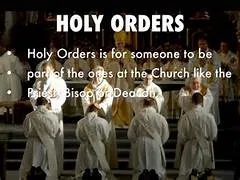
As to Orders. The supreme task which Christ had to fulfill was his priestly work of atonement which he completed as mediator between God and man. By the union in himself of humanity and divinity Christ is by nature the mediator. As a man from among men, Christ is our mediator with the Father; yet he is also capable of offering a worthy sacrifice to God because, by virtue of the union of his human nature with the Second Person of the Godhead, his human actions have in infinite value. In this fullest sense, the priesthood belongs to Christ alone. But if Christ wished to live on and continue his work in the Church, the first thing he had to do was to provide for the continuance of his sacerdotal and mediatory function. Above all, if Christ wished to renew the sacrifice of the Cross throughout the ages and all over the world as the sacrifice of the New Law in the Holy Mass, he had to allow other men to share in his priesthood. For if there is to be a true sacrifice, there must be a priesthood ordained and authorized by God from whose hands God will accept the sacrifice.
Sacrament of Matrimony
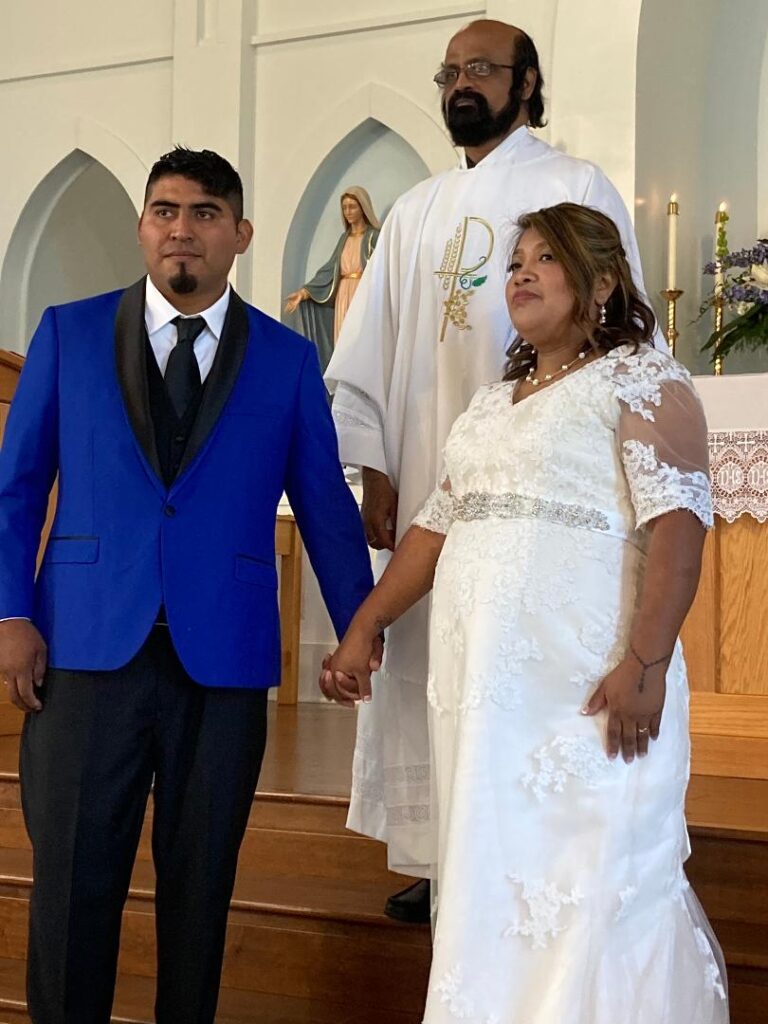
Sacrament of Matrimony
Matrimony is the marriage contract between Christians raised by Christ to the dignity of a sacrament. The theological and dogmatic treatment of this sacrament does not look very much to its main features of unity and indissolubility which are basic characteristics of all marriage in natural ethics; they are rather premises, though of course they attain greater significance and depth and stability in marriage as a sacrament. The fact, then, that these features take up a considerable amount of space in Church documents must not be allowed to hide the theological content of this sacrament which comes to us from revelation and belongs to the supernatural order. As a sacrament, matrimony is entirely oriented on man’s supernatural goal. Matrimony and Holy Orders are the two sacraments which not only serve the individual in reaching this goal but are there for the benefit of the community. Matrimony is there for the mutual help of the spouses and the increase of the people of God. Devotion to his twofold end is the way of salvation for married couples, a way sanctified by the sacrament. ‘Yet she shall be saved through childbearing; if she continues in faith, and love, and sanctification, with sobriety’ (1 Tim:2:15).